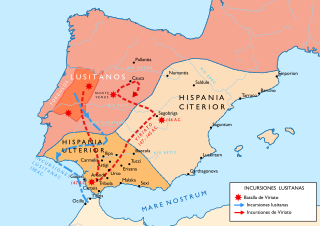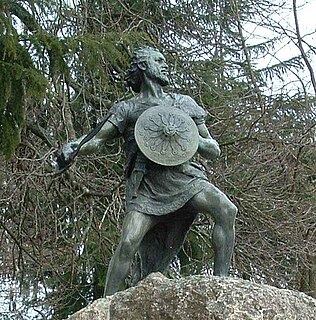Curius and Apuleius were chieftains of the Lusitanians, a proto-Celtic tribe from western Hispania. They were active at the last phase of the Lusitanian War.
Sources describe them as heading a gang of robbers that fought Quintus Fabius Maximus Servilianus while he was entering Lusitania in the search of Viriathus. [1] While it is generally agreed that they commanded Lusitanian forces, [1] their nationality is disputed due to their ostensibly Roman names. It has been argued they might have been either Romanized Iberians [1] [2] or Roman deserters who had adopted local tribal customs. [2] [3] Their relation to Viriathus is also a blurred matter. Oral tradition have them serving as lieutenants to the Lusitanian leader, [4] but it is more likely they were independent rebels from the lands south of the Tajo river, [2] inspired by but not affiliated to Viriathus. [3] In any case, the large size of their forces is considered proof that they were authentic military commanders and not mere bandits. [5]
In 140 BC, after conquering Baeturia and five other cities, Servilianus marched with his remnant 17000 soldiers towards and attacked the Cynetes on his path. [5] When he was approaching the Guadiana river, Curius and Apuleius ambushed him with a contingent of 10000 men, taking him by surprise and stealing his loot. [4] [5] However, the Lusitanian victory was ephemeral, as they decided to divide their forces in order for Curius to retreat with the plunders and a large number of prisoners. This allowed Servilianus to recover and initiate a counterattack, in which Curius was killed and the loot was recovered. [4] [5] The Romans continued their march through Lusitania, where they would be ultimately defeated by Viriathus and forced to sign a peace treaty. [2]
It is traditionally considered they sported Roman names, opening up several theories about their identities. [1] [2] [3] However, it has been suggested ancient chroniclers might have misunderstood their names and turned them into Roman patronymics. [6] Under this view, "Apuleius" might be a corruption of a Celtic name like the preexistent "Apulus" or "Apanus", [6] while "Curius" would come from "Coutius" or "Curundus". [6]

An ambush is a long-established military tactic in which combatants take advantage of concealment and the element of surprise to attack unsuspecting enemy combatants from concealed positions, such as among dense underbrush or behind hilltops. Ambushes have been used consistently throughout history, from ancient to modern warfare. In the 20th century, an ambush might involve thousands of soldiers on a large scale, such as over a choke point such as a mountain pass, or a small irregular band or insurgent group attacking a regular armed force patrol. Theoretically, a single well-armed and concealed soldier could ambush other troops in a surprise attack. Sometimes an ambush can involve the exclusive or combined use of improvised explosive devices, that allow the attackers to hit enemy convoys or patrols while minimizing the risk of being exposed to return fire.

Lusitania or Hispania Lusitana was an ancient Iberian Roman province located where modern Portugal and part of western Spain lie. It was named after the Lusitani or Lusitanian people.

Viriathus was the most important leader of the Lusitanian people that resisted Roman expansion into the regions of western Hispania or western Iberia, where the Roman province of Lusitania would be finally established after the conquest.
Lusitanian mythology is the mythology of the Lusitanians, the Indo-European people of western Iberia, in the territory comprising most of modern Portugal, Galicia, Extremadura and a small part of Salamanca.

The Lusitanians were an Indo-European people living in the west of the Iberian Peninsula prior to its conquest by the Roman Republic and the subsequent incorporation of the territory into the Roman province of Lusitania.

The Vettones were a pre-Roman people of the Iberian Peninsula of possibly Celtic ethnicity.

The Cynetes or Conii were one of the pre-Roman peoples of the Iberian Peninsula, living in today's Algarve and Lower Alentejo regions of southern Portugal, and the southern part of Badajoz and the northwestern portions of Córdoba and Ciudad Real provinces in Spain before the 6th century BCE. According to Justin's epitome, the mythical Gargoris and Habis were the founding kings.

The Celtici were a Celtic tribe or group of tribes of the Iberian peninsula, inhabiting three definite areas: in what today are the regions of Alentejo and the Algarve in Portugal; in the Province of Badajoz and north of Province of Huelva in Spain, in the ancient Baeturia; and along the coastal areas of Galicia. Classical authors give various accounts of the Celtici's relationships with the Gallaeci, Celtiberians and Turdetani.

Hispano-Celtic is a hypernym to include all varieties of Celtic that were spoken in the Iberian Peninsula before the arrival of the Romans :

The Lusitanian War, called Pyrinos Polemos in Greek, was a war of resistance fought by the Lusitanian tribes of Hispania Ulterior against the advancing legions of the Roman Republic from 155 to 139 BC. The Lusitanians revolted on two separate occasions and were pacified. In 154 BC, a long war in Hispania Citerior, known as the Numantine War, was begun by the Celtiberians. It lasted until 133 and is an important event in the integration of what would become Portugal into the Roman and Latin-speaking world.

Audax, Ditalcus and Minurus were Turdetanian warriors who participated in the Lusitanian War. They were the supposed betrayers and assassins of the Lusitanian leader Viriathus.
Gallaecian, or Northwestern Hispano-Celtic, is an extinct Celtic language of the Hispano-Celtic group. It was spoken at the beginning of the 1st millennium in the northwest corner of the Iberian Peninsula that became the Roman province of Gallaecia and is now divided between the present day Norte Region in northern Portugal, and the Spanish regions of Galicia, western Asturias and the west of the Province of León.
Quintus Fabius Maximus Servilianus was the adoptive son of Quintus Fabius Maximus Aemilianus and the natural son of Gnaeus Servilius Caepio --hence the adoptive cognomen Servilianus. He was consul of the Roman Republic in 142 BC together with Lucius Caecilius Metellus Calvus. He was the brother of Gnaeus Servilius Caepio and Quintus Servilius Caepio. All three brothers were commanders in the Roman Province of Hispania Ulterior and fought in the Lusitanian War.
Punicus was a chieftain of the Lusitanians, a proto-Celtic tribe from western Hispania. He became their first military leader during the Lusitanian War, and also led their first major victories against Rome.
Caesarus was a chieftain of the Lusitanians, a proto-Celtic tribe from western Hispania. He followed and later replaced Punicus as their major military leader during the Lusitanian War.
Caucenus was a chieftain of the Lusitanians, a proto-Celtic tribe from western Hispania. He was an important military figure during the earlier phase of the Lusitanian War.
Tanginus was a chieftain of the Celtiberians, active during the Numantine War.

Warfare in ancient Iberian peninsula occupied an important place in historical chronicles, first during the Carthaginian invasion of Hispania, including the Punic Wars, and later during the Roman conquest of the peninsula. The densely bellicose character of the Pre-Roman peoples who inhabited Hispania was repeatedly shown in their conflicts against Rome, Carthage and each other.
Viriathus was a leader of Gallaecian and Lusitanian mercenaries in the Carthaginian army during the Second Punic War, according to Silius Italicus's poem Punica.
Tautalus was a chieftain of the Lusitanians, a proto-Celtic tribe from western Hispania. He replaced Viriathus at the last year of the Lusitanian War.